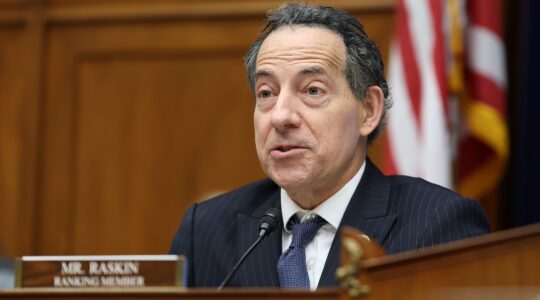WASHINGTON (JTA) – Rabbi Kerry Olitzky has been urging the Jewish community to be more welcoming to intermarried and unaffiliated families for the past 20 years.
Now the executive director of the Jewish Outreach Institute and his New York-based organization seem poised for a major breakthrough.
At its oversubscribed conference in Washington last weekend, the institute launched a new national outreach advocacy coalition. This comes on the heels of a big growth spurt in outreach programming throughout the country.
“I’d like to believe we’ve reached the tipping point,” said Olitzky, looking around at the 250 rabbis, Jewish educators, lay leaders and professionals who gathered for the three-day confab.
They were there to learn how to make their institutions more accessible and engaging – and, not coincidentally, to grow their memberships.
“We’re sitting on top of something incredible here,” said Rabbi Alvin Sugarman, rabbi emeritus of The Temple in Atlanta. “Two hundred and fifty this year, 2,500 next year. If Jewish continuity was the watchword for the past 10 years, now it’s this.”
The highlight of the get-together was Olitzky’s announcement of the Big Tent Judaism Coalition, an online directory of Jewish institutions committed to inclusiveness and an open-door policy.
Anyone can sign onto the coalition at www.BigTentJudaism.org, Olitzky said, and become part of a national network that will share outreach resources, receive free training from institute staff and spread the message of inclusiveness – code for welcoming those not traditionally part of the Jewish community, particularly the intermarried, converts, and gays and lesbians.
“We will help those institutions that sign up to become more welcoming, and people looking can come to us and we’ll put them in touch with these welcoming institutions,” Olitzky said.
The institute has made a big push in the past two years to get outreach on top of the Jewish agenda.
Its Mothers Circle, a support group for non-Jewish women who are raising Jewish children, has exploded since late 2005 from one city to 26.
This year, with funding from the Samuel Bronfman Foundation, the institute began working with Hillel on 10 college campuses. This summer it began piloting a synagogue outreach program for intermarried families in Atlanta, Philadelphia and Los Angeles.
The Grandparents Circle, a support group for grandparents with intermarried children, is set to kick off in Los Angeles, and in the spring the institute hopes to offer Empowering Ruth, a multi-week course to teach new women converts the practical details of building Jewish homes.
These projects require funders who believe in outreach, Olitzky noted, as well as communal organizations willing to give up their private fiefdoms and work together.
More and more Jewish communities have bought into the outreach agenda.
“Outreach and engagement are the No. 1 priority for our federation today,” said Dottie Bennett, a lay leader at the Jewish Federation of Greater Washington, echoing sentiments shared by many of her colleagues.
While there was a good cross-section of liberal rabbis at the conference, the Orthodox buy-in is still negligible. Rabbi David Rebibo of Phoenix was one of just two Orthodox rabbis there.
Although cautious about opening Jewish doors too wide, Rebibo said the Orthodox world shares the same concerns about dwindling Jewish engagement.
“We can’t be blind to what’s going on,” he said. “The concept of being welcoming is important. So is education. What, do I want a little club of just Orthodox?”
Even rabbis from the liberal denominations said that outreach always involves setting boundaries.
Rabbi Brigitte Rosenberg, spiritual leader of the United Hebrew Congregation in St. Louis, noted that she is a Reform rabbi who does not officiate at interfaith weddings.
“To some people, that means I’m not welcoming,” she said.
Rosenberg said she appreciated having the chance to hear from Jewish leaders outside her own movement.
“What’s the goal of outreach?” she asked rhetorically. “Is the tent open to everybody, or are there standards? What maintains the validity of a Jewish community?”

Help ensure Jewish news remains accessible to all. Your donation to the Jewish Telegraphic Agency powers the trusted journalism that has connected Jewish communities worldwide for more than 100 years. With your help, JTA can continue to deliver vital news and insights. Donate today.





